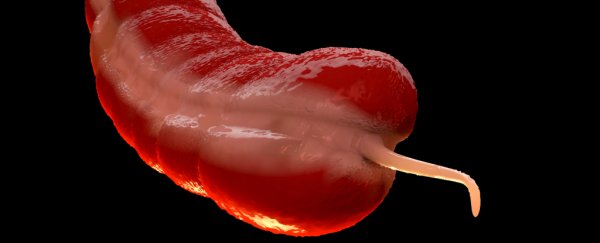There seems to be a link between the degenerative neurological disorder Parkinson's disease and your appendix. Just what that relationship might be, nobody can agree upon, but here's what we know so far.
Late last year, an analysis of 1.7 million people found you were 25 percent less likely to develop the condition if you had your appendix removed. Now a bigger study says the complete opposite. Believe it or not, this is science working perfectly.
Physician Mohammed Z. Sheriff from Case Western Reserve University knows better than most just how confusing all this might seem.
Over the years there have been a number of studies claiming that having your appendix taken out delays the onset of Parkinson's disease, increases your risk of developing Parkinson's disease, or has absolutely no effect whatsoever.
The cause for the intense interest is a protein believed to be behind Parkinson's; that protein is also found in the gut following inflammation.
"Recent research into the cause of Parkinson's has centred around alpha-synuclein, a protein found in the gastrointestinal tract early in the onset of Parkinson's," says Sheriff.
Focus has fallen on the appendix thanks largely to its potential role in providing a safe harbour for protective gut microflora, leading to suspicions that removing it might cause levels of alpha-synuclein to increase.
But science needs more than gut feelings. It needs a balance of evidence. And that evidence has so far said appendectomies raise, lower, and have zero effect on your chances of developing the disorder.
So Sheriff pulled out the really big guns. Like, 62,218,050 of them.
From this enormous databank of US electronic health records, Sheriff and his colleagues sifted out 488,190 patients who'd undergone an appendectomy. Of those, they found 4,470 also developed Parkinson's disease.
Comparing these with the 177,230 Parkinson's cases who still had their appendix revealed a startling contrast.
Based on these figures, having your appendix removed makes it three times more likely you'll be diagnosed with Parkinson's disease some time later in life.
That's not to say removing this tiny nub of intestinal flesh somehow causes the degeneration of nervous tissue responsible for Parkinson's symptoms. But it does suggest something is going on.
"This research shows a clear relationship between the appendix, or appendix removal, and Parkinson's disease, but it is only an association," says Sheriff.
"Additional research is needed to confirm this connection and to better understand the mechanisms involved."
Aside from a detailed abstract, there's little of the team's work to analyse at this stage. Sheriff will be presenting his data at a digestive disease conference in a little over a week.
The results will no doubt stir debate on the topic, and hopefully encourage interest in getting to the bottom of the mystery of how immune processes in the gut kick off problems in the brain, if they do so at all.
It's tempting to throw our hands up and think science is broken. But conflicting results like these often highlight deeper complexities on how health science works.
It's a case of 'watch this space' for more studies to weigh in and reveal hidden details.
Meanwhile, what are we to make of all this personally?
Aside from being a curiosity… not much. Nobody should go get their appendix removed simply to avoid developing Parkinson's disease.
Those numbers – as scary as they might look – need to be taken into context.
In 2016, an estimated 6.1 million people around the world had Parkinson's disease. That's roughly 1 to 2 out of every 1,000.
Not that this really helps you calculate your individual risk. Your individual chances of developing the condition in the future depend on a wide variety of factors, from your health habits to your genes, where you live to even your level of income.
Strangely, smoking actually lowers your risk of developing the condition by as much as 40 percent. Given the variety of health concerns that arise with tobacco use, nobody is going to suggest you start buying cigarettes on the back of this news.
Likewise, we suggest you only worry about your appendix if it's about to pop, and keep your eyes open for the next chapter in this fascinating, if strange, saga.
